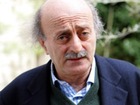Speaker Nabih Berri will likely propose a “solution” to the dispute over the parliamentary electoral law next week.
Health Minister Ali Hassan Khalil told al-Manar television on Saturday that the solution entails adopting proportional representation for the law.
 Full Story
Full Story
United Nations Special Coordinator for Lebanon Derek Plumbly denied any plans to set up refugee camps for the Syrians in Lebanon, praising the Lebanese authorities’ commitment to the humanitarian needs of the displaced.
“The number of the Syrian refugees in Lebanon is increasing and I was impressed by the hospitable Lebanese residents along the border,” Plumbly said in an interview with An Nahar newspaper published on Friday.
 Full Story
Full Story
The formation of an oil authority is absent from the agenda of a cabinet session on Friday but progress is being made to speed up exploration of potential offshore gas and oil reserves.
The authority is tasked with overseeing the petroleum sector for the purpose of exploring the reserves.
 Full Story
Full Story
A “disgust” expressed by Speaker Nabih Berri and the “negative distinction” caused by Phalange MP Sami Gemayel were the major highlights of the last day of a parliamentary session that led to the government’s survival of a vote of confidence.
The three-day session that ended after midnight Thursday included 30 hours of statements by 62 MPs and responses by five members of the cabinet and Premier Najib Miqati. Among the 62 lawmakers, 34 were from the March 14-led opposition and 28 were members of the Hizbullah-led March 8 coalition.
 Full Story
Full Story
The March 8 camp MPs continued their defense of the government during the third day of a parliament session aimed at assessing its performance.
Development and Liberation bloc MP Yassine Jaber kicked off the session by saying that the Lebanese people “have grown fed up with the political debates outside and within the government.”
 Full Story
Full Story
Premier Najib Miqati kept mum to the severe criticism launched against him by March 14 opposition MPs during a parliamentary session but has vowed to make a calm response that sets the policies of his cabinet and future expectations.
Lawmakers attended the session on Thursday on its third and last day before Miqati issues his response to what his sources said were “parliamentary deliberations that led to a dispute between the majority and opposition to settle scores.”
 Full Story
Full Story
Progressive Socialist Party leader Walid Jumblat rejected a proposal made by Speaker Nabih Berri to consider Lebanon a single electoral district in a proportional representation law that would be adopted in the upcoming parliamentary elections and lead to the establishment of a senate.
“Honestly, I am not excited for a senate now because if we want to implement the Taef Accord literally then the formation of the senate is linked to the abolishment of political confessionalism which I don’t think is appropriate for the time being,” Jumblat told As Safir daily published Thursday.
 Full Story
Full Story
President Michel Suleiman expressed confidence on Thursday that the parties rejecting proportional representation in the parliamentary elections will eventually support it.
“Those publically standing against proportionality today will be with it in the future,” Suleiman told As Safir daily about al-Mustaqbal movement leader ex-PM Saad Hariri and Progressive Socialist Party chief Walid Jumblat.
 Full Story
Full Story
March 8 camp MPs took turns on Wednesday in defending the government on the second day of the session aimed at assessing its work.
Development and Liberation bloc MP Ghazi Zoaiter defended the government’s decision to distance itself from regional affairs, saying that such a position guarantees Lebanon’s neutrality and its equidistance from all sides.
 Full Story
Full Story
March 14 opposition MPs resumed Wednesday their attack on the government on the second day of a three-day parliamentary session, which will witness statements by 53 more lawmakers.
Lebanese Forces MP Antoine Abou Khater accused the cabinet of corruption, reiterating that it was formed through a coup against ex-Premier Saad Hariri’s former government last year.
 Full Story
Full Story



